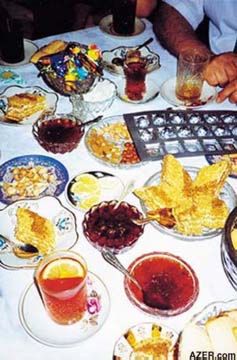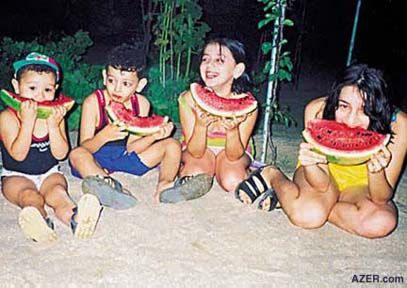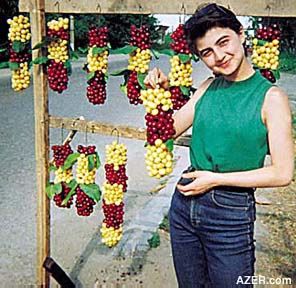|

Autumn 2000 (8.3)
"Just a
Cup of Tea"
Sociolinguistically
Speaking - Part 7
by Jala Garibova
and Betty Blair
  Come for a cup of tea. Come for a cup of tea.

It's a situation that most foreigners in Azerbaijan can attest
to. They get invited to someone's home "just for a cup of
tea" only to arrive and find an elaborate meal spread out
for them. Though Azerbaijanis tend towards exaggeration and hyperbole
in ordinary speech, when it comes to talking about their own
hospitality, they're inclined toward modesty and understatement.
That casual "cup of tea" may actually have taken hours
to prepare.
Left:
A "simple"
cup of tea for a guest might also involve a spread of jams, cake,
nuts and chocolate. Photo: Blair
In Azerbaijan it's definitely "who you know" not "what
you know" that makes a person successful. Drinking tea and
entertaining others is an essential ingredient for cementing
and maintaining friendships. When an Azerbaijani complains of
having almost no relations with someone, he may say:
I haven't
even had a cup of tea with him.

Azerbaijanis
have another expression which means, "to have a meal
together."

Literally, "to cut bread"
But the pleasure
comes with obligations. For example, Azerbaijanis complain, "How
could he treat me so badly? We've 'cut bread' together."
There's an expectation of loyalty and commitment once people
have dined together, especially if they have been entertained
at home.
Tea may precede, as well as follow, meals. Tea is served in a
pear-shaped glass. Its unique shape allows the tea at the top
of the glass to cool while the tea in the bottom of the glass
remains hot for quite some time.
Tea is usually offered with thin lemon slices and hard candy.
You'll rarely find it served with milk. And you'll rarely be
served pre-sweetened tea. That's only for kids at breakfast.
In Iran, where an estimated 25-30 million Azerbaijanis live,
cubed sugar is served alongside tea as the preferred sweetener.
Tea is such an integral part of everyday life that Azerbaijanis
take it for granted. Whether the weather is frigid or sweltering,
hot tea is the drink of hospitality. It is offered at anytime
of day or night. In fact, many offices hire a full-time person
to make the rounds serving tea all day long. And even refugees,
who barely manage to put a scrap of bread on the table, feel
bad if they can't offer guests a cup of tea, even if it's very
weak and barely has any color to it.
Always Prepared
But at home, most hosts will offer guests food along with that
cup of tea - unless the visit is short. Even then, baked goods
and cookies, preserves, chocolates and fruit are likely to be
spread on the table. Azerbaijanis have learned to expect guests
at their door any time of day or night, so they always keep some
refreshments stashed away. A good housewife is always prepared.

As for drinks during the meal, they may offer "ayran",
a yogurt-based beverage served cold, or fruit juices, soft drinks
or mineral water. In the Azerbaijan Republic at dinner, alcohol
is likely to be served. Most men drink; most women don't, though
out of courtesy women may clink glasses and join in the rounds
of toasts. The exception for drinking is during the religious
month of Maharram, which commemorates the Shiite Imam Hussein's
death. In Iran, since alcohol is prohibited, drinking is rarer.
Foreigners are usually surprised at the abundance of food that
is spread out on the table.
In the Republic, tables are generally long and narrow, and the
living room usually doubles for the dining room (and, sometimes,
even as a bedroom). The table is absolutely covered with small
dishes so that food is within easy reach of everyone. Never mind
the enormous mess to clean up afterwards!
Seating Order
The most respected person (often the oldest one) is invited to
sit at the head of the table. This is a very conscious act and
everyone understands the social hierarchy, though it may be unspoken.

Come and sit at the head.
If that person
feels that someone else deserves the honor, he will, in turn,
offer the seat to the person he considers more deserving, especially
if someone older is present.
Azerbaijanis are used to lots of guests joining them at meals.
It's not uncommon for 10, 12 or 15 people to be gathered around
the table. Despite the crowded conditions, no one is expected
to sit at a corner edge of the table or they're likely to be
told:

Don't sit at the corner.
To make the
argument more convincing, they might add that any unmarried person
who sits at the corner will never get married.

You will never get married.
Another version could be:

It will be seven
years before you marry.
Literally,
"You'll get married in seven years."
Or, even more
disconcerting:

People who come to ask for your hand will be refused.
This implies that someone will want to marry you but your
parents will not grant permission.
Sometimes a married person will even offer to change places with
an unmarried person stuck on the
  corner. Of course, many
people consider this a joke, but others take it quite seriously. corner. Of course, many
people consider this a joke, but others take it quite seriously.
Serving Guests
In most families, when food is brought to the table, the oldest
woman (a grandmother, mother or mother-in-law) serves up the
plates. Guests generally wait for an older person to start eating
first. The host is likely to urge his guests to begin eating
by saying:

Don't let it get cold.
Left:
Traditional
way of selling cherries at roadside stands. Photo: Blair.
He may also say:

Good appetite, equivalent to the French phrase "Bon appétit."
The same expression
may be used when an Azerbaijani runs into a friend or acquaintance
eating at a restaurant or in someone's home.
Second Helpings
It's not unusual for a host to urge guests to eat more and more
food. An Azerbaijani proverb says:

The guest will never say, "I'm full."
It is assumed
that the guest will be too shy to help himself, so the hosts
continuously watch when plates get empty and automatically dish
up more food unless you stop them. If the guest doesn't want
to eat any more food, he can say:

Thanks, enough. I won't be able to eat more.

I've had food at home as well, so I'm not hungry.
If the guest should want more food, he may say:

It's very tasty.

I want to try this one, too.
It's also expected
that guests won't just "eat and run". Even though meals
may last three or four hours - even at lunch, if you're a special
guest. Of course, now that Azerbaijan has gained its independence,
people are much more time-conscious than in the past. They don't
have as much leisure time. When Azerbaijanis need to leave early,
they sometimes excuse themselves by saying:

We're like Lazgi guests-leaving as soon as we've eaten.
Lazgins are
natives of Daghestan, a part of the Russian Federation on the
northern border of Azerbaijan. Lazgins have the reputation of
being very time-conscious.
  Thanking the Host Thanking the Host
At the end of the meal, guests say:

Thanks. May God make it [the food] more.

May your table (literally, tablecloth) always be spread open.
Meaning, may you always have food in abundance.
Satisfaction
for the meal may be expressed by saying:

It was very tasty.

It was very delicious.
Guests compliment
the cook by saying:

May your hands and arms be healthy.
After finishing the food, besides using the expression
 , (Many thanks),
some people - especially the elderly - say: , (Many thanks),
some people - especially the elderly - say:

(Thank God), we ate and are no longer hungry. May God feed
those who are hungry.
(Meaning, those in real hunger and need).
Leftovers from
a meal may be sent home with guests, especially if a member of
the family was unable to attend, such as a child, an older relative,
a pregnant woman or someone who is sick.
When food is served at a funeral, the phrase  (May
God accept it) is more likely to be used instead of "Thank
you." This is because food at a funeral is considered
to be offered as "ehsan", the funeral meal,
or for those who are poor. This phrase implies God's acceptance
of this gesture. (May
God accept it) is more likely to be used instead of "Thank
you." This is because food at a funeral is considered
to be offered as "ehsan", the funeral meal,
or for those who are poor. This phrase implies God's acceptance
of this gesture.
Sacredness of Food
Azerbaijanis view food as sacred, especially the natural produce
grown from the earth. It's not unusual for older people to encourage
young people to start their meal:

In the name of God.
They usually acknowledge that the meal is finished by saying
 (many thanks,
implying thanks to God). (many thanks,
implying thanks to God).
Food prepared from dough is especially viewed as sacred. It's
not unusual for an Azerbaijani to stop on the sidewalk or street
to stoop and pick up a piece of bread and place it on a windowsill
or some place aside so that it won't be stepped on.
Azerbaijanis have a special expression to identify an ungrateful
person:

The one who steps on bread.
Or they may
convey the same ungratefulness by saying:

He has bread on his knees.
Generally, stale
bread is not thrown away. Instead, it is placed in plastic bags
and set in a conspicuous place outside the entrance of the home
or apartment so that other people know to take it for their cattle
or poultry.
Table Manners
Parents work hard to teach their children appropriate table etiquette.
They consider it very rude if children are greedy or are unable
to hide their hunger or need in front of others. Note the popular
Azerbaijani proverb:

Even let God know you eat pilaf.
Pilaf is considered
the most luxurious of meals. In the Republic it is reserved on
special occasions - weddings, banquets, special dinners, though
in Iran, Azerbaijanis are likely to eat rice dishes everyday.
So the proverb suggests that you should even hide your needs
from God and keep them to yourself. Children usually are warned
not to reach for anything at the table or to taste anything before
it is offered.
Parents urge children not to leave food on their plates. Sometimes
they'll say:

You're not going to be pretty / handsome if you leave food
on the plate.

Your fiancé won't be good-looking
If a child leaves
a piece of bread uneaten, he may be reprimanded:

Eat it up. Otherwise it [the bread] will be chasing you your
whole life.

If you leave this piece of bread, it will cry.
Clearly, food
and hospitality are central to Azerbaijani culture. It is synonymous
with social gatherings. It's hard to imagine having good times
without good food there. That's just the way things are in Azerbaijan.
As a foreigner living or visiting the country, no doubt you'll
have countless invitations to experience it when you stop by
for "just a cup of tea!"
Nush olsun! Enjoy!
Jala Garibova has a doctorate in
linguistics and teaches at Western University in Baku. Betty
Blair is the Founding Editor of Azerbaijan International
and also of the new WEB site, AZERI.org, where the entire
archives of this "Sociolinguistically Speaking" series
may be accessed.
_____
Back to Sociolinguistically
Speaking
From Azerbaijan
International
(8.3) Autumn 2000.
© Azerbaijan International 2000. All rights reserved.
Home | About
Azeri | Learn Azeri
| Contact us
|




